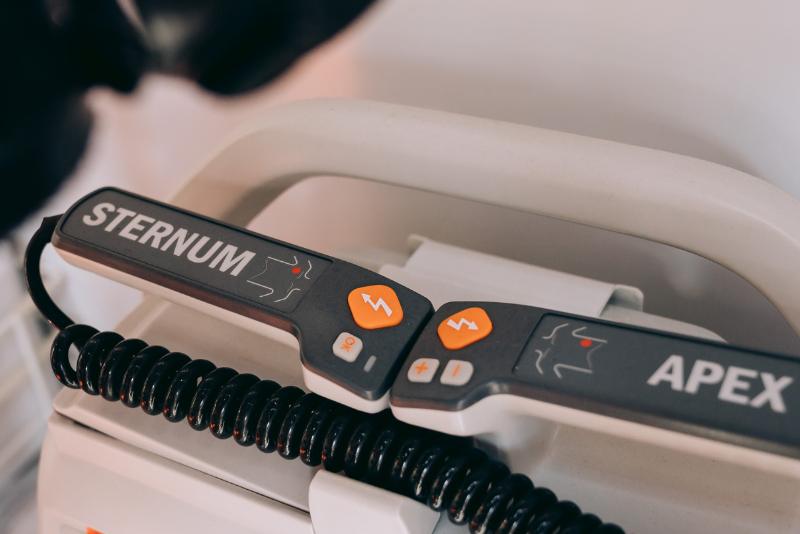If you own or operate a grocery store or restaurant in Maryland, a new law may require you to install an Automated External Defibrillator (AED) by January 1, 2025. This law applies to specific establishments, with exemptions for certain businesses based on income and size.
What Does the Law Require?
Starting January 1, 2025, specified grocery stores and restaurants must have an AED in a prominent, accessible location for employees and customers. The device must be properly maintained to ensure functionality in case of emergency.
What is an AED?
An AED is a lightweight, portable device that delivers an electric shock to the heart when it detects an abnormal rhythm, potentially saving a person’s life during sudden cardiac arrest. Immediate use of an AED, in conjunction with CPR, can significantly increase survival rates.
Background on the Law: The Joe Sheya Act
In 2014, Joe Sheya suffered a fatal heart attack while dining at a restaurant in Maryland. The restaurant did not have an AED on-site, and by the time EMTs arrived, it was too late to save him. This tragedy led to the passage of the “Joe Sheya Act,” aimed at increasing AED accessibility in public spaces.
Why AEDs Matter
AEDs can make the difference between life and death during cardiac arrest. Every minute without defibrillation decreases a person’s chance of survival by 7% to 10%. With average ambulance response times ranging from 7 to 14 minutes, immediate access to an AED is crucial.
Does This Law Apply to Your Business?
- Grocery Stores: You must comply if your store has all major food departments (produce, meat, seafood, dairy, and packaged goods) or at least one major food department and a minimum of 12,000 square feet of floor space. Stores with annual gross incomes of $10 million or less are exempt.
- Restaurants: Restaurants with annual gross incomes of $1 million or less (excluding off-premises sales) or a seating capacity of less than 100 individuals is exempt.
If you meet these criteria and are not exempt, the law applies to you.
What Happens if You Don’t Comply?
Failure to install and maintain an AED may result in disciplinary action from the Maryland Department of Health. Additionally, you could face civil liability if a customer experiences cardiac arrest and there is no AED on-site to assist.
Where to Buy an AED
The cost of an AED ranges from $1,400 to $2,500 depending on features. You can purchase AEDs directly from vendors such as:
For comprehensive service, we recommend Heart to Beat, a Maryland-based company that offers full-service AED solutions, including installation, maintenance, and training. PSA clients receive a 10% discount on AED packages. Contact Scott Kuhlman at scott@hearttobeatllc.com or (443) 330-7793 for more information.
*Note: PSA does not profit from this recommendation and has no financial interest in Heart to Beat.*
AED Maintenance and Training
While AEDs are user-friendly, they do require periodic maintenance. Designate someone to check the device regularly to ensure it’s ready to use in an emergency. Training your employees on AED use is also crucial; proper training can boost confidence during a crisis.
Training options include:
- Heart to Beat
- National Safety Council
- Red Cross
- American Heart Association
- Many local hospitals and community colleges.
Registering Your AED
While you are not required to participate in the full Maryland Public Access AED Program, you must register your AED with the Maryland Institute for Emergency Medical Services Systems (MIEMSS). Registration helps emergency dispatchers locate your AED and ensures you receive maintenance and recall notices.
Liability Protection
The law provides liability protection for businesses and individuals using AEDs in good faith. As long as your business complies with the AED law by maintaining the device and using it in a prudent manner, you will not be held civilly liable for providing—or failing to provide—AED assistance.
Tax Benefits for AED Purchases
Businesses may be eligible for tax deductions for AED purchases as ordinary business expenses. Additionally, certain Maryland restaurants can claim a nonrefundable tax credit of up to $500 for AED purchases. Consult your tax advisor for details.
Need Help?
For equipment-specific questions, contact one of the AED vendors. For other inquiries, reach out to Steve Pomponi, VP, Risk and Safety Management at spomponi@psafinancial.com.
*Please note that PSA cannot offer legal or tax advice.*




